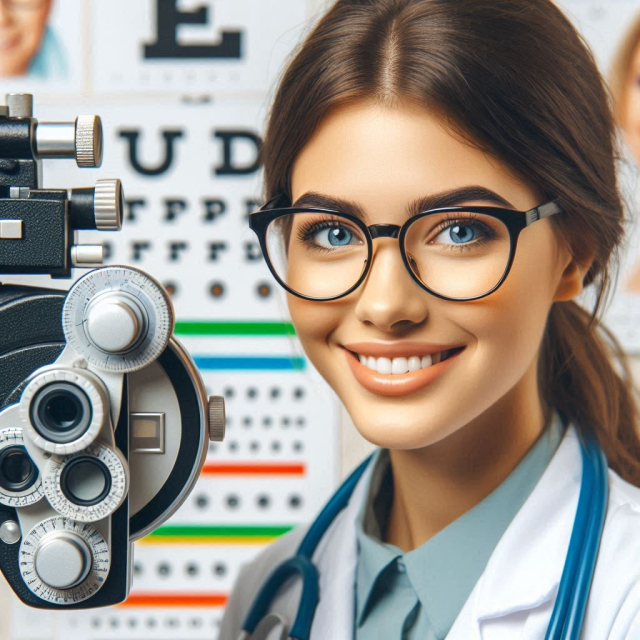Our eyes are extraordinary and delicate organs that allow us to perceive the world around us. However, we often take our vision for granted until we start experiencing problems. Taking care of our eyesight is essential to maintaining a good quality of life. This article offers a complete guide on how to protect our eyes and maintain good visual health.
Importance of Sight.
Sight is one of the most important senses, since it provides us with 80% of the information we receive from the environment. It helps us to:
- Navigate and move: It allows us to move safely and efficiently.
- Communicate: It helps us read body language and facial expressions.
- Work and study: Most work and educational activities rely heavily on vision.
- Enjoy leisure: Watch television, read books, enjoy landscapes and do recreational activities.
Factors That Can Affect Vision.
There are several factors that can affect our vision, including:
- Aging: Vision often deteriorates with age, which can lead to conditions such as presbyopia, cataracts and macular degeneration.
- Genetics: Some people are more prone to vision problems due to genetic factors.
- Light Exposure: Excessive exposure to ultraviolet (UV) light and digital screens can damage our eyes.
- Health conditions: Diseases such as diabetes and hypertension can affect eye health.
- Life habits: Smoking, poor diet and a sedentary lifestyle can contribute to visual problems.
Steps to Take Care of Our Vision.
Perform Regular Visual Exams.
Regular eye exams are essential to detect problems early and treat any eye conditions in a timely manner. It is recommended:
- Annual checkups: Get a comprehensive eye exam at least once a year, especially after age 40.
- Detect changes: Consult your ophthalmologist if you notice changes in your vision, such as blurred vision, flashes of light, or difficulty seeing in the dark.
- Manage diseases: People with chronic diseases such as diabetes should have more frequent eye exams, as they are at higher risk of developing eye complications.
Protect Eyes from Ultraviolet Light.
Exposure to ultraviolet light can damage our eyes and increase the risk of cataracts and macular degeneration. To protect yourself:
- Wear sunglasses: Choose sunglasses that block 100% of UVA and UVB rays.
- Quality lenses: Opt for good quality sunglasses that provide adequate protection.
- Caps and hats: Wear wide-brimmed hats to protect your eyes from the sun.
Take care of your eyesight at work and at home.
We spend many hours a day in front of digital screens, which can cause eye fatigue. To reduce eye strain:
- 20-20-20 Rule: Every 20 minutes, look at something 20 feet (6 meters) away for at least 20 seconds.
- Blink frequently: Blinking helps keep your eyes lubricated and reduces dry eyes.
- Adjust lighting: Make sure the room is well lit and there are no reflections on the screen.
- Use screen filters: Screen filters can reduce glare and eye strain.
Maintain a Healthy Diet.
A balanced diet is crucial to maintaining good eye health. Some important nutrients are:
- Vitamin A: It is essential for good night vision and to prevent dry eyes. It is found in foods such as carrots, spinach, and sweet potatoes.
- Vitamin C: Helps protect eyes from damage caused by free radicals. It is found in citrus fruits, strawberries and peppers.
- Vitamin E: Contributes to eye health by protecting cells from oxidative damage. It is found in nuts, seeds and vegetable oils.
- Omega-3 fatty acids: They are beneficial in preventing macular degeneration and dry eyes. They are found in fatty fish such as salmon and sardines.
- Zinc: Helps maintain retinal health and protects against macular degeneration. It is found in lean meats, seafood and legumes.
Avoid Harmful Habits.
Some habits can damage our eyes and should be avoided:
- Smoking: Smoking is associated with an increased risk of cataracts, macular degeneration, and optic nerve damage.
- Contact lens misuse: Do not sleep with contact lenses unless they are designed for extended wear and follow proper cleaning and wearing instructions.
- Rubbing your eyes: Rubbing your eyes can cause irritation and damage the cornea.
Maintain Good Eye Hygiene.
Eye hygiene is important to prevent infections and other problems:
- Wash your hands: Wash your hands before touching your eyes or handling contact lenses.
- Remove makeup properly: Remove eye makeup before sleeping to avoid irritation and blockages in the tear ducts.
- Avoid sharing eye products: Do not share eye drops, makeup or other products that come into contact with the eyes.
Control Systemic Diseases.
Diseases such as diabetes and hypertension can affect eye health:
- Proper management of diabetes: Keep blood sugar levels under control to prevent eye complications such as diabetic retinopathy.
- Blood pressure control: Maintain blood pressure at normal levels to reduce the risk of eye damage.
Regular Exercise.
Regular exercise improves blood circulation and can help maintain eye health:
- Physical activity: Performing physical activities such as walking, swimming or playing sports helps improve circulation and reduce the risk of age-related eye diseases.
- Yoga and eye exercises: Some eye exercises can help relax eye muscles and improve flexibility and coordination.
Taking care of our eyesight is essential to maintaining a good quality of life and enjoying all the visual wonders the world has to offer. Adopting healthy habits, performing regular eye exams, protecting your eyes from ultraviolet light and maintaining a balanced diet are some of the key measures to protect our eyes. By taking these precautions, we can preserve our vision and keep our eyes in optimal condition throughout our lives.






